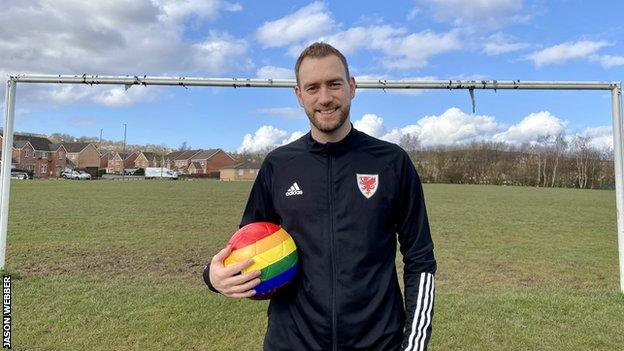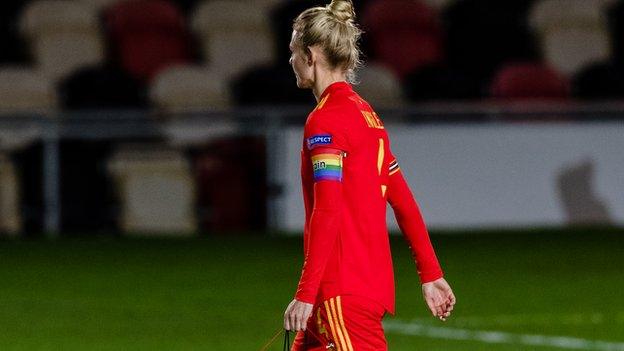Rainbow Wall: New fans' group created for Wales' LGBTQ+ fans
- Published

Jason Webber joined the Football Association of Wales in June 2020 having previously worked for Show Racism the Red Card
First there was the Red Wall, now comes the Rainbow Wall.
Wales' army of football fans have become known as the Red Wall in recent years, with the nickname taking hold during the nation's glorious run to the Euro 2016 semi-finals.
The Rainbow Wall is the name being adopted by Wales' first supporters' group for members of the LGBTQ+ community.
The hope is that the newly-created group will make life easier for LGBTQ+ fans who want to follow Wales.
"Unfortunately, for some people, football maybe historically hasn't been as welcoming (as it could have been)," says Jason Webber, the Football Association's of Wales' equality, diversity, inclusion and integrity manager.
"Some people have had some negative experiences.
"Lots of people have had positive experiences, but it's for those that maybe have that perception, (for whom) that fear of going to games is very real.
"The idea is that having a supporters' group, that support network and safe environment, will encourage some of those individuals to go to the games who maybe were reluctant to beforehand."
The Rainbow Wall will be officially launched ahead of Wales' World Cup qualifier in Belgium on 24 March, when a virtual pre-match social will be held jointly with the Belgians' LGBTQ+ fans' group.
"It's a bit of a trailblazing event and I can see it catching on, with national associations and countries doing the same sort of thing before games moving forward," Webber says.
How many people will join Wales' LGBTQ+ supporters' group is difficult to predict.
The FAW's most recent survey suggested around 2% of people involved in Welsh football - whether it be players, coaches, match officials or fans - are part of the LGBTQ+ community.
Wales' leading clubs have been involved in the setting up of the national fan group, which mirrors England's Three Lions Pride.
Swansea City's Proud Swans group has existed for a number of years, while the Proud Dragons have recently been formed in Wrexham.
Discussions about creating groups at Cardiff City and Newport County are ongoing.

Wales captain Sophie Ingle wears a rainbow armband in support of the Rainbow Laces campaign, which aims to tackle homophobic, biphobic and transphobic attitudes in sport
"Hopefully in the next number of weeks every club - Cardiff, Swansea, Wrexham, Newport - will have their own LGBTQ+ fans groups that will all link in to one another as well as the national group," Webber says.
"And moving beyond that, it's working with the Cymru League teams and down from there."
Webber was appointed by the FAW in June 2020, with chief executive Jonathan Ford - whose future is now in doubt - saying he would ensure "equality, diversity and inclusion mainstream" in all the association's work.
Webber's job is to try to ensure no area of Welsh society is under-represented in Welsh football.
February is Football v Homophobia month, and will see the launch of the LGBT Football Network in Wales.
"That's particularly targeted at grassroots clubs, around being an LGBTQ+-inclusive club," Webber explains.
"So, you know, what things can clubs practically do to ensure they are welcoming to the LGBTQ+ community, for any individual players who might to decide to come out?
"Do people feel they can be who they really are and still belong and be accepted and part of that environment?"
The challenge is similar when it comes to Welsh football fans.
A key goal for the FAW is to ensure members of the LGBTQ+ community have no concerns about following Wales or Welsh clubs.
Generally speaking, Webber says, the situation is positive.
"I think since the whole Together Stronger strap line, the fans have just been coming closer and closer following the national teams," he says.
"We need to continue to capture that. Of course, there will be some individuals who might have had some negative experiences, whether that be nationally or at club level.
"Irrespective of your skin colour, your religion, your disability and what your gender or sexual identity is, we are all Wales fans trying to support the team in winning the game.
"That's what it should be about and I think, while the (Rainbow Wall) supporters' group in the interim will provide that safe space, the idea in the long run is that everybody is just part of that Red Wall."